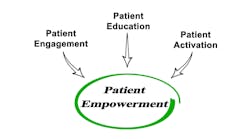Study: 9 in 10 Hospitals, Health Systems Making Major Patient Engagement Investments
Nearly nine in 10 hospitals and health systems that took part in a recent survey said they have made significant investments in digital patient engagement tools.
The recent study, Trends in Digital Patient Engagement 2017, came from Menlo Park, Calif.-based Spyglass Consulting Group. The research found that 89 percent of hospitals and health systems surveyed have made significant investments in digital patient engagement tools to help transform the way patients and family members are engaged, educated, and empowered. As a result, they take a more active role in managing their health across the care continuum within hospitals, ambulatory environments, clinics, physician offices, and even at home.
The findings were derived from more than 100 interviews with healthcare professionals working in hospital-based environments who were representative of a broad range of medical specialties, organization types, and organization sizes.
With the transition toward patient and family centered care models and the adoption of various at-risk reimbursement models, hospitals surveyed are evaluating next generation digital engagement tools to help reduce healthcare costs, improve care quality and outcomes, and increase patient and provider satisfaction. Some of the study’s key takeaways include:
- Hospitals are targeting chronically ill patients. Eighty-nine percent of hospitals surveyed report that future investments focus on integrating digital engagement tools with evidence-based pathways and care management programs to support chronically ill patients with CHF, COPD, diabetes, asthma, cancer and stroke.
- Hospitals are exploring collaboration opportunities with payers. Forty-nine percent of hospitals surveyed were exploring collaboration opportunities with CMS (the Centers for Medicare & Medicaid Services), and other third-party payers to subsidize patient engagement initiatives associated with value-based care programs.
- Hospitals are facing challenges to support widespread deployments including low end-user adoption, poorly defined requirements, and lack of evidence demonstrating clinical efficacy.


